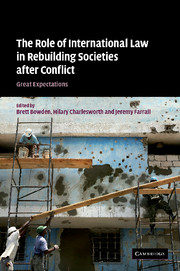Book contents
- Frontmatter
- Contents
- Contributors
- Preface
- Abbreviations
- Introduction
- 1 The ‘state-building enterprise’: Legal doctrine, progress narratives and managerial governance
- 2 Democratisation, state-building and politics as technology
- 3 International law, human rights and the transformative occupation of Iraq
- 4 Defining democracy in international institutions
- 5 Democracy and legitimation: Challenges in the reconstitution of political processes in Afghanistan
- 6 Impossible expectations? The UN Security Council's promotion of the rule of law after conflict
- 7 Legal pluralism and the challenge of building the rule of law in post-conflict states: A case study of Timor-Leste
- 8 From paper to practice: The role of treaty ratification post-conflict
- 9 Selective universality? Human-rights accountability of the UN in post-conflict operations
- 10 ‘Security starts with the law’: The role of international law in the protection of women's security post-conflict
- 11 Grappling in the Great Lakes: The challenges of international justice in Rwanda, the Democratic Republic of Congo and Uganda
- Conclusion: Hope and humility for weavers with international law
- Select Bibliography
- Index
5 - Democracy and legitimation: Challenges in the reconstitution of political processes in Afghanistan
Published online by Cambridge University Press: 31 August 2009
- Frontmatter
- Contents
- Contributors
- Preface
- Abbreviations
- Introduction
- 1 The ‘state-building enterprise’: Legal doctrine, progress narratives and managerial governance
- 2 Democratisation, state-building and politics as technology
- 3 International law, human rights and the transformative occupation of Iraq
- 4 Defining democracy in international institutions
- 5 Democracy and legitimation: Challenges in the reconstitution of political processes in Afghanistan
- 6 Impossible expectations? The UN Security Council's promotion of the rule of law after conflict
- 7 Legal pluralism and the challenge of building the rule of law in post-conflict states: A case study of Timor-Leste
- 8 From paper to practice: The role of treaty ratification post-conflict
- 9 Selective universality? Human-rights accountability of the UN in post-conflict operations
- 10 ‘Security starts with the law’: The role of international law in the protection of women's security post-conflict
- 11 Grappling in the Great Lakes: The challenges of international justice in Rwanda, the Democratic Republic of Congo and Uganda
- Conclusion: Hope and humility for weavers with international law
- Select Bibliography
- Index
Summary
Introduction
From December 2001 to December 2005, Afghanistan underwent a process of political transition. The path to be followed was established at a conference in Bonn from 27 November to 5 December 2001 under the auspices of the United Nations which brought together ‘non-Taliban’ Afghan political actors. The conference led to the signing of an ‘Agreement on Provisional Arrangements in Afghanistan Pending the Re-establishment of Permanent Government Institutions’, which was subsequently endorsed by the UN Security Council in Resolution 1383 (2001). A number of key landmarks on this pathway formed essential elements of the transition. On 22 December 2001, an interim authority took office at a ceremony in Kabul, headed by Hamed Karzai and comprising a chairman, five vice chairmen and twenty-four other members. From 11 to 19 June 2002, a so-called ‘Emergency Loya Jirga’ (Great Assembly) was held to transform the interim authority into a more broadly based transitional administration. In order to equip Afghanistan with a new constitution, a ‘Constitutional Loya Jirga’ was held between 14 December 2003 and 4 January 2004 with 502 members, most of them elected through an indirect but lively process, but some appointed by Karzai, which led to the adoption of the new constitution (Qanun-e Asasi-i Afghanistan). Following this, a presidential election was held on 9 October 2004 which resulted in the election of Karzai as president for a five-year term with 55.4 per cent of the popular vote; and on 18 September 2005, further elections were held for provincial councils and for the Wolesi Jirga, the lower house of a new bicameral Parliament, which met for the first time on 19 December 2005, almost four years to the day since the interim authority had been constituted.
- Type
- Chapter
- Information
- The Role of International Law in Rebuilding Societies after ConflictGreat Expectations, pp. 111 - 133Publisher: Cambridge University PressPrint publication year: 2009
- 4
- Cited by



